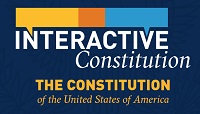Jeffrey Rosen, president and CEO of the National Constitution Center, welcomes you to We the People, a weekly show of constitutional debate.
In this episode, we discuss the administrative state under President Trump. As a presidential candidate, Donald Trump ran on a platform of rolling back the “administrative state.” Since taking office, President Trump has followed through on some of his campaign promises, signing various Executive Orders aimed at undoing previous Executive Orders issued by President Obama. What will be the impact of the president’s regulatory agenda? Is Trump restoring constitutional order and checks and balances through his executive orders?
 Karen Harned is Executive Director of the National Federation of Independent Business Small Business Legal Center, a post she has held since April 2002. Prior to joining the Legal Center, Ms. Harned was an attorney at a Washington, D.C. law firm specializing in food and drug law, where she represented several small and large businesses and their respective trade associations before Congress and federal agencies. Her organization, NFIB, was involved in litigation against the Affordable Care Act, in NFIB v. Sebelius.
Karen Harned is Executive Director of the National Federation of Independent Business Small Business Legal Center, a post she has held since April 2002. Prior to joining the Legal Center, Ms. Harned was an attorney at a Washington, D.C. law firm specializing in food and drug law, where she represented several small and large businesses and their respective trade associations before Congress and federal agencies. Her organization, NFIB, was involved in litigation against the Affordable Care Act, in NFIB v. Sebelius.
 Dan Hemel is Assistant Professor of Law at the University of Chicago Law School. His research focuses on taxation, risk regulation, and innovation law. His current projects examine the effect of tax expenditures on inequality; the role of cost-benefit analysis in tax administration; and the use of tax incentives to encourage knowledge production. He has served as visiting counsel at the Joint Committee on Taxation. He blogs at Take Care.
Dan Hemel is Assistant Professor of Law at the University of Chicago Law School. His research focuses on taxation, risk regulation, and innovation law. His current projects examine the effect of tax expenditures on inequality; the role of cost-benefit analysis in tax administration; and the use of tax incentives to encourage knowledge production. He has served as visiting counsel at the Joint Committee on Taxation. He blogs at Take Care.
 Jeffrey Rosen is the President and Chief Executive Officer of the National Constitution Center, the only institution in America chartered by Congress “to disseminate information about the United States Constitution on a nonpartisan basis.” He is also a professor at The George Washington University Law School, and a contributing editor for The Atlantic. Rosen is a graduate of Harvard College; Oxford University, where he was a Marshall Scholar; and Yale Law School.
Jeffrey Rosen is the President and Chief Executive Officer of the National Constitution Center, the only institution in America chartered by Congress “to disseminate information about the United States Constitution on a nonpartisan basis.” He is also a professor at The George Washington University Law School, and a contributing editor for The Atlantic. Rosen is a graduate of Harvard College; Oxford University, where he was a Marshall Scholar; and Yale Law School.
Related Cases
Additional Resources
 Our Interactive Constitution is the leading digital resource about the debates and text behind the greatest vision of human freedom in history, the U.S. Constitution. Here, scholars from across the legal and philosophical spectrum interact with each other to explore the meaning of each provision of our founding document.
Our Interactive Constitution is the leading digital resource about the debates and text behind the greatest vision of human freedom in history, the U.S. Constitution. Here, scholars from across the legal and philosophical spectrum interact with each other to explore the meaning of each provision of our founding document.
Common Interpretation
Article I, Section 1: General Principles By William N. Eskridge, Jr. and Neomi Rao
Matters of Debate
Article I, Section 1: The Delegation Doctrine by William N. Eskridge, Jr.
Article I, Section I: The Non-Delegation Principle Persists by Neomi Rao
Stay Connected and Learn More
Continue today’s conversation on Facebook and Twitter using @ConstitutionCtr.
Sign up to receive Constitution Weekly, our email roundup of constitutional news and debate, at bit.ly/constitutionweekly.
Please subscribe to We the People and our companion podcast, Live at America’s Town Hall, on iTunes, Stitcher, or your favorite podcast app.
We the People is a member of Slate’s Panoply network. Check out the full roster of podcasts at Panoply.fm.
The Constitution Center is offering CLE credits for select America’s Town Hall programs! In-person credit is now available in Pennsylvania, with more states to come soon.
And finally, despite our congressional charter, the National Constitution Center is a private nonprofit; we receive little government support, and we rely on the generosity of people around the country who are inspired by our nonpartisan mission of constitutional debate and education. Please consider becoming a member to support our work, including this podcast.








